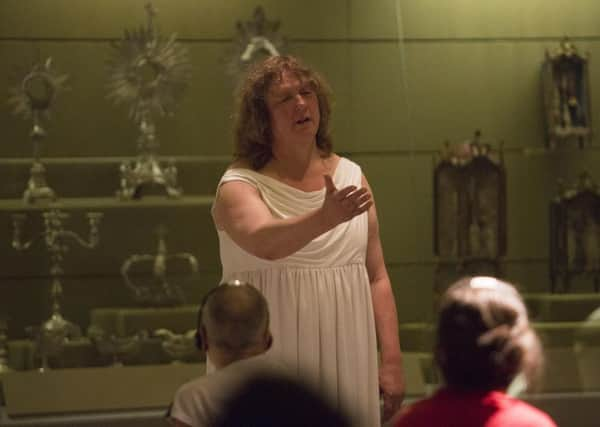Joyce McMillan: Jo Clifford keeps faith with controversial play


When the Edinburgh playwright and performer Jo Clifford flew out to Brazil early in May, on a British Council-sponsored trip to the International Theatre Festival in Belo Horizonte, she knew that she might be heading into some controversy. Her one-woman show, The Gospel According To Jesus, Queen Of Heaven, is controversial wherever it goes – a remarkable event, more like a reinvented 21st century church service than a theatre performance, that invites us to imagine the Christian gospel of love fully applied to the battered people, planet and politics of our time, and filtered through the sensibility of someone who finally refuses the “privilege” of masculinity conferred by birth, and faces all the perils of life as a transgender outsider.
It’s an idea that offends Christians with traditional beliefs about Jesus and about gender relations – all the more so because Jo herself is a transgender woman, formerly known as John Clifford, and celebrated as one of the brilliant young Traverse playwrights of the 1980s. When Jesus, Queen Of Heaven was first performed in Glasgow in 2009, it sparked a hymn-singing demonstration in the street outside. And earlier this year, when Clifford performed the show at St Chrysostom’s Church in Manchester, determined efforts were made to have the whole event cancelled.
Advertisement
Hide Ad“What I hadn’t anticipated, though,” says Clifford, “was that I would arrive in Brazil not only to the usual debate about the show, but in the middle of a full-blown political crisis that’s of great importance to LGBT people there. When I arrived, Dilma Rousseff’s centre-left government had just been overthrown in a kind of parliamentary coup, allegedly on grounds of corruption – although the right-wing opposition who took over are arguably even more corrupt. They’re a very socially conservative group, with strong links to evangelical churches; the government appointed by the new acting President was the first all-male one Brazil has seen in decades. And one of their first acts was to remove a vital piece of legislation brought in by the last government to protect LGBT rights.
“So when I started performing in Belo Horizonte, I just found myself at the centre of this tempest of political conflict and debate. The show couldn’t have been more topical, and there was a huge amount of media coverage – all of it very respectful and positive, I have to say. When tickets went on sale, all my performances sold out in less than an hour; and the intensity of the response was thrilling, even slightly frightening.”
Clifford has visited Brazil before, giving workshops as part of the British Council’s Transform programme to support LGBT rights in South America; so despite the tense political situation, she wasn’t surprised by the warmth of the welcome she received.
“Brazil is such a warm, pulsating place, just exploding with life and colour and beautiful people. So although the country is facing a massive economic and political crisis, there’s also this tremendous diversity, and a terrific creative energy and generosity.
“Apart from the performances in Belo Horizonte, I was taking part in a whole series of other events. With the FLUP literary festival in Rio, we did a reading in a community centre in the City of God, one of the most famous favellas in the world – and that seemed to be attended by the whole local community. At one venue owned by a supporter of the new government, we had to make our way through a cordon of riot police protecting the building from angry demonstrators outside. I even had my first experience of seeing Jesus, Queen of Heaven being performed, in its new Portuguese translation, by someone else, the wonderful transgender performer Renata Carvalho, and that made me realise that in some ways, this really is a Brazilian play!
“Yet everywhere I went, everyone I met was good to me, kindly and respectful.” After major heart surgery a few years ago, Clifford still has occasional problems with an irregular heartbeat, which led to her fainting into the audience at one performance in Brazil, and being admitted to an ordinary women’s ward staffed by exceedingly kind and caring nurses.
Advertisement
Hide Ad“It really was the most amazing experience,” says Clifford, “and so inspiring. Do I think this new government in Brazil will last? No I don’t, I think it’s incredibly fragile. It certainly represents the elite that still controls most of the wealth. But I don’t think it represents what ordinary people want and need, and that truth will soon emerge.”
Back in the UK, Clifford is looking forward to a busy period. The Graeae Company is planning a revival of her version of The House Of Bernarda Alba, the Royal Exchange in Manchester has commissioned a new play about Marx and Engels in London, and there’s a new transgender project Eve And Adam, with the National Theatre of Scotland, currently postponed following Laurie Sansom’s resignation, but likely to be staged in 2017.
Advertisement
Hide Ad“It very strange and very wonderful, what’s happened in the last few years,” says Clifford. “When I first wrote this play, I couldn’t get anyone to stage it at all. I just had to keep it going by producing and financing it myself. But then last year it made it into the Made In Scotland showcase on the Edinburgh Fringe. That changed everything – and now look at it, travelling the world, and really making a difference to the lives of people in Brazil, as well as here.
“So it seems that sometimes, when you have a good idea, you just have to keep working at it and staying with it, until it finds its time. That’s what’s happened with Jesus, Queen Of Heaven, over the past few years; and for me, it’s just a wonderful time to be alive and performing this work, which seems to mean so much to so many people, wherever I take it, and wherever it goes.”